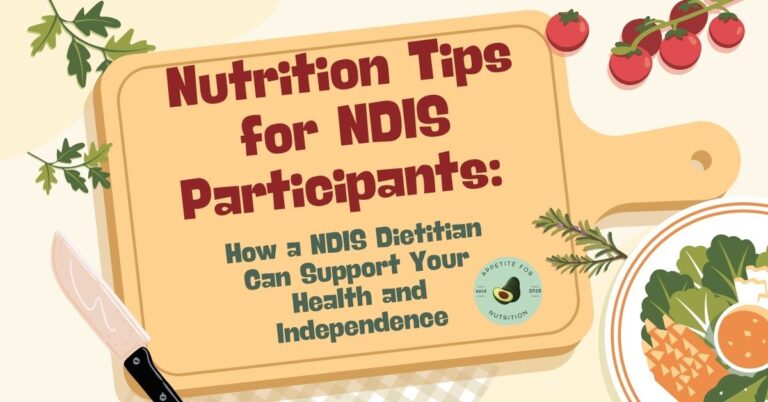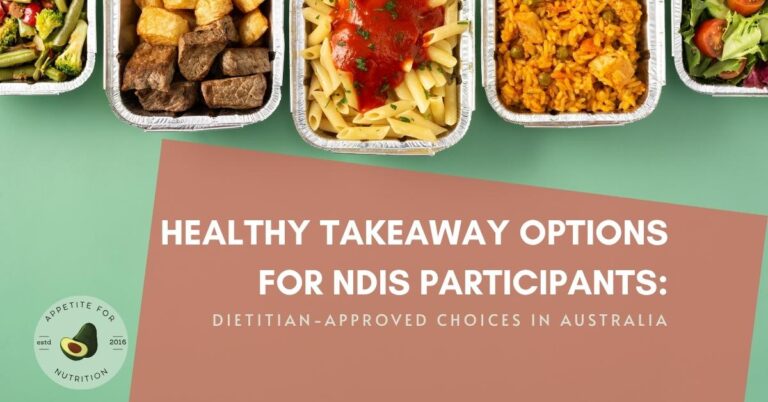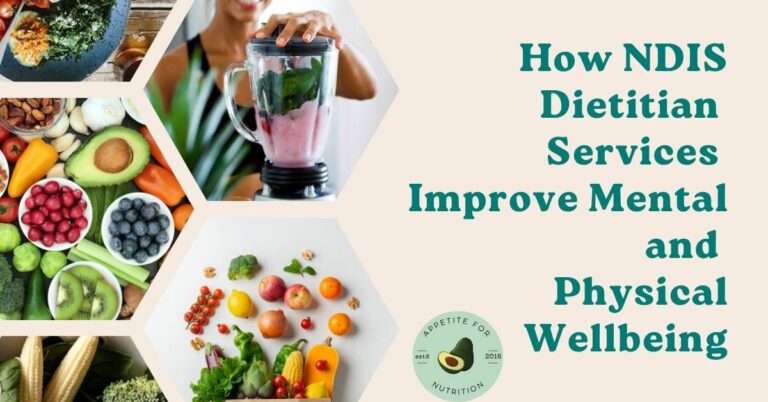
Collaborating for NDIS Support: The Role of Dietitians, Speech Pathologists, and Occupational Therapists
When supporting individuals with disabilities through the National Disability Insurance Scheme (NDIS), collaboration between allied health professionals is key. Occupational Therapists (OTs) and Speech Pathologists (SPs) help participants build essential skills for daily living and communication — but NDIS dietitians add a vital layer of support that addresses nutritional health, energy, and wellbeing.
This article explores how dietitians complement OTs and SPs to deliver holistic, person-centred care for people with disabilities.
The Essential Role of an NDIS Dietitian
An NDIS-registered dietitian is an integral part of a participant’s multidisciplinary team. Their expertise in food, nutrition, and medical nutrition therapy supports individuals who face barriers to eating well — whether due to sensory challenges, swallowing difficulties, or chronic conditions.
1. Tailored Nutrition Support for People with Disabilities
Many NDIS participants — including those with Autism Spectrum Disorder (ASD), Cerebral Palsy, intellectual disabilities, or neurological conditions — experience difficulties in meal planning, food preparation, or maintaining balanced nutrition.
An NDIS Dietitian provides individualised, evidence-based support such as:
Helping individuals with sensory food aversions find safe, enjoyable alternatives.
Creating texture-modified diets for participants with chewing or swallowing challenges.
Supporting carers and families to manage mealtime stress and improve nutritional intake.
2. Supporting Feeding and Swallowing Difficulties
While Speech Pathologists assess and manage swallowing mechanics, dietitians optimise the nutritional side. Together, they ensure participants receive the right nutrients safely and comfortably.
Dietitians can:
Recommend appropriate food textures or supplement options.
Prevent dehydration and malnutrition by tailoring hydration and nutrient intake.
Work alongside SPs to balance feeding safety with enjoyment and variety in meals.
3. Managing Chronic Conditions and Complex Needs
Some NDIS participants live with chronic conditions such as diabetes, obesity, coeliac disease, or gastrointestinal disorders. Dietitians play a crucial role in managing these conditions through tailored nutrition plans and ongoing monitoring.
They can:
Develop individualised meal plans that align with medical needs and NDIS goals.
Provide nutrition education for long-term health maintenance.
Help manage medication-related side effects impacting appetite or digestion.
How Dietitians, OTs, and SPs Collaborate for Holistic Care
Working together, these professionals ensure that no aspect of a participant’s health is overlooked.
Here’s how collaboration works in practice:
Coordinated Feeding and Mealtime Support
SPs assess swallowing safety and recommend safe textures.
OTs help with physical positioning, adaptive equipment, and mealtime independence.
Dietitians ensure the diet remains nutritionally adequate and enjoyable.
Managing Co-Occurring Conditions
Participants with autism or neurological conditions may face both sensory challenges and gut issues.The OT supports sensory regulation.
The SP helps improve communication around food preferences.
The dietitian designs a diet that supports gut health, energy, and overall wellbeing.
Empowering Independence and Choice
All three professions share a common goal — empowering participants to live independently.The OT builds physical skills for daily living.
The SP improves communication and mealtime engagement.
The dietitian ensures participants can make informed, confident food choices.
The Value of Dietitian Services in NDIS Funding
Accessing an NDIS dietitian isn’t just about food — it’s about achieving meaningful life goals. Dietitian support can be funded under Capacity Building or Improved Daily Living categories within an NDIS plan.
A dietitian can:
Conduct comprehensive nutritional assessments.
Provide reports and evidence for plan reviews.
Collaborate with the wider care team to align nutrition goals with overall wellbeing and independence.
Their services help participants improve quality of life, build independence, and reduce long-term healthcare risks — making them an essential part of any NDIS support plan.
Conclusion
Dietitians play a pivotal role in enhancing the health and independence of NDIS participants. By collaborating with OTs and Speech Pathologists, they ensure that nutritional care works hand-in-hand with communication, physical, and emotional wellbeing.
Together, these professionals form a comprehensive, person-centred support team that empowers individuals with disabilities to thrive.
If you’re an NDIS participant or provider seeking nutrition support, contact our team today. Our NDIS-registered dietitians can help you develop a personalised, achievable plan for better health and quality of life.
👉 Book a Consultation or Make a Referral
This blog was last updated October 2025.
Frequency Asked Questions
Find quick answers to common questions
Our team of NDIS-registered dietitians helps clients make practical, evidence-based food decisions that fit their goals, lifestyle, and budget.
A NDIS dietitian supports individuals with disabilities to achieve their nutrition and health goals. They assess dietary needs, create tailored meal plans, and work with participants, families, and carers to improve nutrition, independence, and overall wellbeing. Dietitians often collaborate with Occupational Therapists (OTs), Speech Pathologists (SPs), and support coordinators as part of a multidisciplinary care team.
Any NDIS participant who has nutrition-related challenges — such as difficulty eating, managing medical conditions, food aversions, or unbalanced eating patterns — may be eligible for dietitian support. Nutrition services are typically funded under Capacity Building – Improved Daily Living or Improved Health and Wellbeing categories of an NDIS plan.
NDIS dietitians support participants with a wide range of conditions, including:
Autism Spectrum Disorder (ASD)
Cerebral Palsy
Down Syndrome
Intellectual or developmental disabilities
Sensory processing disorders
Feeding difficulties or tube feeding
Diabetes, coeliac disease, or gastrointestinal issues
Weight management and appetite challenges
They also help manage nutritional needs associated with neurological or physical disabilities.
Dietitians, OTs, and SPs work closely to ensure participants receive safe, effective, and enjoyable mealtime experiences:
Speech Pathologists assess and manage swallowing safety.
Occupational Therapists support posture, motor skills, and adaptive equipment for independence.
Dietitians ensure meals are nutritionally adequate, enjoyable, and tailored to individual needs.
This collaboration ensures holistic, person-centred care for every participant.
You can access NDIS dietitian services by:
Discussing your nutrition-related goals with your NDIS planner or support coordinator.
Including nutrition support under “Improved Daily Living” or “Improved Health and Wellbeing.”
Choosing an NDIS-registered dietitian, such as those at Appetite for Nutrition, who can complete assessments, create meal plans, and provide reports for plan reviews.
Our team offers both in-person consults (in Brisbane, Gold Coast, Melbourne, Shepparton, Bendigo, and Albury-Wodonga) and telehealth appointments Australia-wide.
Yes. Dietitians can manage tube feeding schedules, recommend appropriate formulas, and ensure adequate calorie and nutrient intake. They also design texture-modified diets for individuals with chewing or swallowing difficulties, ensuring meals are safe and nutritionally balanced.
Working with a dietitian can help participants:
Improve energy, mood, and concentration.
Manage chronic conditions more effectively.
Develop independence with food preparation.
Reduce mealtime stress for participants and carers.
Achieve long-term health goals through practical, evidence-based nutrition strategies.
Set clear goals, stay consistent with appointments, and communicate openly with your dietitian about your challenges and progress. Nutrition improvements take time, but small, steady changes can lead to lasting health and lifestyle benefits.
Yes. Our NDIS-registered dietitians offer customised meal plans tailored to medical conditions, preferences, and functional needs. We also provide resources for carers, practical guides, and ongoing support to help participants eat well and live more independently.
You can book a consultation or make a referral directly through Appetite for Nutrition.
info@appetitefornutrition.com.au
www.appetitefornutrition.com.au
Our friendly team will guide you through the process, help you make the most of your funding, and match you with the right dietitian for your goals.



